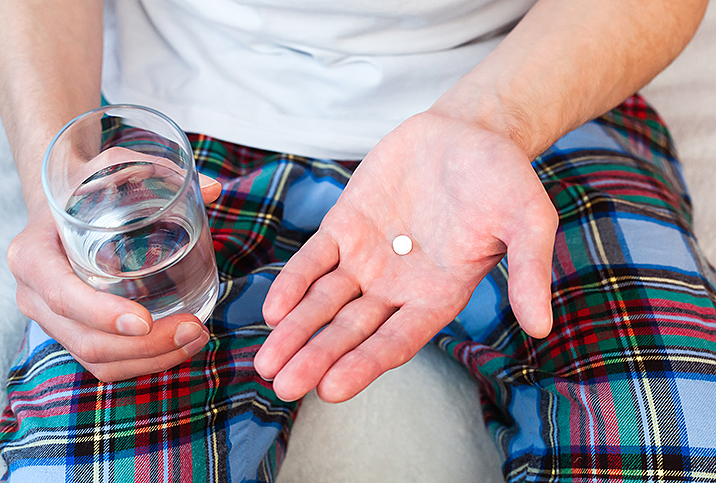What to Know About Depression and Anxiety

Anyone who has struggled with anxiety or depression knows that mental health issues can affect every part of life, making even seemingly mundane tasks like getting out of bed in the morning or responding to emails feel insurmountable.
According to the Anxiety and Depression Association of America, nearly 40 million people in the U.S.—or about 18 percent of the nation's population—are affected by anxiety disorders. Medical experts have found that individuals who struggle with anxiety disorders often deal with depression as well. In fact, the association reported that nearly half of people diagnosed with depression also end up being diagnosed with an anxiety disorder.
Since anxiety and depression are so widespread, the chances are that if you have not dealt with them yourself, you likely know someone who has. In this article, we'll talk more about what exactly anxiety and depression are, risk factors for the disorders, as well as treatment options.
Understanding depression
One of the most popular mental health misconceptions is that depression is merely a fancy term for feeling down in the dumps or generally sad. However, depression is more than just feeling blue, and those who suffer with it can't simply "snap out" of it.
Mental health experts define depression, which is sometimes referred to as major depressive disorder or clinical depression, as a mood disorder that causes a persistent feeling of sadness and loss of interest. Depression can affect every aspect of an individual's life as they lose interest in things they used to enjoy doing such as spending time with family and friends or romantic partners.
Some people may only experience depression once, while others may experience depressive episodes periodically throughout their lifetime. Depressive episodes occur when an individual experiences symptoms of depression throughout most of the day, nearly every day, for an extended period of time.
Some of the most common symptoms of depression include:
- Persistent feelings of sadness, emptiness or hopelessness
- Loss of interest in things you usually find enjoyable
- Trouble sleeping or sleeping too much
- Emotional outbursts of anger or irritability
- Anxiety
- A feeling of persistent tiredness and lack of energy
- Restlessness
- Difficulty concentrating, remembering things or thinking
- Feelings of worthlessness or self-loathing
- Unexplained physical aches and pain
- Thoughts about death, suicidal ideation or attempts at suicide
For a person going through a depressive episode, even basic tasks like getting out of bed, showering or fulfilling day-to-day responsibilities can feel impossible. They may feel deeply unhappy for reasons they don't know or understand.
Unfortunately, experts do not yet know what exactly causes depression. However, there are some factors that have been linked to and may have a hand in causing depression and other mental health disorders, including biological differences, hormones, genetics and brain chemistry.
According to the Mayo Clinic, people with depression seem to have physical changes to their brain. And while the significance of these changes is uncertain, research into what causes them is actively underway.
Experts also believe that changes in hormones may be involved in triggering depression. These hormonal changes can happen after pregnancy, during menopause or as the result of thyroid problems or other health conditions.
Research has found that depression is more common among people whose family members also have had depression, indicating that certain genetic traits might put some people at a greater risk of depression. But research is still being done to pinpoint which particular genes might be involved in causing depression.
Brain chemistry may also play a significant role in depression. Researchers are currently studying how neurotransmitters, which are naturally occurring brain chemicals, interact with the parts of the brain responsible for maintaining mood. Some experts believe that abnormally functioning neurotransmitters may be a contributing cause for depression.
If you think you might be experiencing depression, you should reach out to a mental health professional or even your general practitioner who can help evaluate you for depression and make treatment recommendations. If you are having suicidal thoughts or behavior, seek emergency help immediately.
The basics of anxiety
Most people will experience feelings of stress and anxiety at some point in their lives. However, for people with an anxiety disorder, those feelings are frequent and persistent, often causing excessive worry and fear about everyday things. This can get in the way of carrying out daily tasks or other responsibilities.
Sometimes, anxiety disorders can cause episodes of panic attacks, in which intense feelings of anxiety or fear reach a peak over the span of a few minutes, causing a strong emotional and sometimes physical reaction.
There are a variety of different types of anxiety disorders, including generalized anxiety, separation anxiety, social anxiety and more. Experts are unsure what exactly causes anxiety disorders, although traumatic events are known to trigger anxiety disorders in people who are already prone to being anxious or have a genetic history of anxiety.
Common symptoms of anxiety disorders include:
- Nervousness or restlessness
- Feelings of panic or fear
- Having a persistent sense of impending danger
- Increased heart rate
- Rapid breathing
- Sweating
- Feeling weak or tired
- Overwhelming worry
- Trouble concentrating or sleeping
- Gastrointestinal problems
If you think you might be struggling with an anxiety disorder, be sure to reach out to a mental health professional for help. There are lots of ways to cope and manage anxiety without medication, including therapy, mindfulness, meditation, breathing techniques and yoga.
Risk factors and demographics
Depression and anxiety can occur at any age, but they often begin in the teens, 20s or 30s. Statistics show that more women are diagnosed each year with depression; however, some experts believe that may largely be due to the fact that men may not be as likely to seek treatment as women.
Research has found that there are a few common factors that may put a person at a greater risk of developing both anxiety and depression, including:
- Trauma: Studies have found that people who have been abused, especially in childhood, or have experienced other trauma are more likely to develop depression or anxiety at some point in their lives.
- Family history: Anxiety and depression are most common among individuals whose relatives have also had anxiety or depression.
- Other mental health disorders: People with depression are more likely to develop an anxiety disorder, and vice versa. Individuals who have had an eating disorder or post-traumatic stress disorder (PTSD) are also more likely to experience anxiety and depression.
- Drugs or alcohol: According to the Mayo Clinic, anxiety and depression can be worsened by the use or misuse of drugs or alcohol.
- Stress: A buildup of stress over time or a sudden major stressor, such as a death in the family or financial problems, can increase a person's risk for developing anxiety and depression.
Treatment options
The two most common treatments for anxiety and depression are psychotherapy and medication.
During psychotherapy, also known as talk therapy or psychological counseling, a patient works with a trained, licensed therapist to help reduce symptoms of anxiety and depression by talking through any underlying issues and coming up with ways to manage any symptoms that may come up in the future.
Medication can also be effective in treating anxiety and depression. In fact, some medications can be used to treat both disorders at the same time, but it may take some time to find the medicine and the specific dose that works best for you. The only way to do this is through trial and error in consultation with your doctor, and some doctors are now using the DNA from saliva to choose which medication is best for a person's genetic profile.
According to the Mayo Clinic, here are some of the most common medicines prescribed for depression, some of which are also used to treat anxiety:
- Selective serotonin reuptake inhibitors (SSRIs): This class of medication is often what doctors prescribe first, as they are generally considered safer and are known to cause fewer side effects than some other types of antidepressants. SSRIs include citalopram (Celexa), escitalopram (Lexapro), fluoxetine (Prozac), paroxetine (Paxil, Pexeva), sertraline (Zoloft) and vilazodone (Viibryd).
- Serotonin-norepinephrine reuptake inhibitors (SNRIs): Examples of SNRIs include duloxetine (Cymbalta), venlafaxine (Effexor XR), desvenlafaxine (Pristiq, Khedezla) and levomilnacipran (Fetzima).
- Atypical antidepressants: These include bupropion (Wellbutrin XL, Wellbutrin SR, Aplenzin, Forfivo XL), mirtazapine (Remeron), nefazodone, trazodone and vortioxetine (Trintellix).
- Tricyclic antidepressants: While very effective, these drugs are known to cause more severe side effects than some other antidepressants. As a result, tricyclic antidepressants are often used only if other medications don't help. Examples of tricyclic drugs include imipramine (Tofranil), nortriptyline (Pamelor), amitriptyline, doxepin, trimipramine (Surmontil), desipramine (Norpramin) and protriptyline (Vivactil).
- Monoamine oxidase inhibitors (MAOIs): MAOIs can cause severe side effects and are usually prescribed only when other medicines have not led to any improvement in symptoms. Patients must follow a strict diet while on MAOIs as they can have dangerous or fatal interactions with certain foods. Examples of MAOIs include tranylcypromine (Parnate), phenelzine (Nardil), isocarboxazid (Marplan) and Selegiline (Emsam).
Antihistamines and beta blockers are sometimes used to treat milder cases of anxiety, while benzodiazepines such as Xanax or Klonopin may be used to treat acute panic attacks, but they have a higher risk of addiction.
Once you start taking medication to treat anxiety or depression, it's important to keep your doctor informed about any side effects you experience so that the dose of the medication can be adjusted, if necessary. If after a couple of months you don't notice any improvement in your symptoms, talk to your doctor to find out if you should try something new. It is also very important to talk to a doctor immediately if symptoms worsen, especially in adolescents.
Anxiety and depression are serious mental disorders that can cause many hardships in life and relationships. If you're struggling with your mental health, talk to your doctor and be sure to lean on your emotional support system—you don't have to go through this alone—organizations like NAMI can help immediately.


















